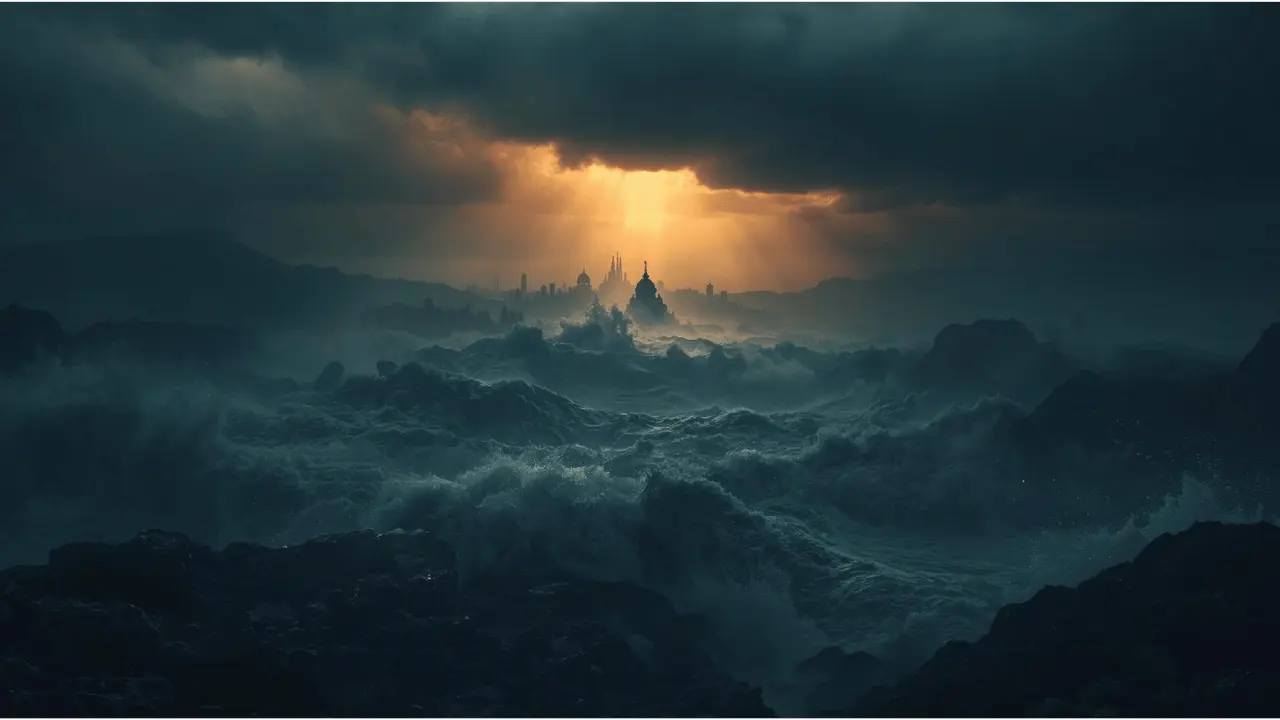The Calm Beneath the Chaos
“God is our refuge and strength, a very present help in trouble.”
For centuries, these opening words of Psalm 46 have comforted believers in moments of fear, crisis, and uncertainty. They’ve been whispered in hospital corridors, quoted in war rooms, carved into wooden plaques, and sung in churches through the ages — most famously through Martin Luther’s hymn, “A Mighty Fortress Is Our God.”
But if you look closer, something extraordinary emerges. Hidden between trembling mountains and roaring seas is a prophetic promise — one that doesn’t just bring comfort in the present but points forward to the future.
Psalm 46 isn’t only about God’s protection in moments of panic. It’s a declaration of prophecy — a glimpse of the day when He will be exalted among all nations, when wars will cease, and when His presence will flood the world like a river of peace.
1. When the Earth Trembles

The Psalm opens with a world in turmoil:
“Therefore we will not fear, though the earth be removed,
and though the mountains be carried into the midst of the sea.” (Psalm 46:2)
Mountains crumble. Waters roar. Nations rage. Yet, in the midst of it all, the psalmist speaks of peace.
A Crisis with Cosmic Echoes
Historically, Psalm 46 may have been written during King Hezekiah’s reign, when the Assyrian army surrounded Jerusalem (2 Kings 19). The city faced certain destruction — until God miraculously intervened overnight.
But the imagery goes far beyond one historical moment. The language of collapsing mountains and raging seas suggests a cosmic shaking — the kind of upheaval that signals divine intervention.
Chaos as the Canvas for Revelation
In Scripture, chaos often comes before revelation. When the earth trembles, it’s not just a disaster — it’s a sign that God is about to move.
Here, the trembling of creation becomes the backdrop for a deeper truth: even when everything around us collapses, God’s presence remains unshakable.
And that enduring presence leads us to the hidden prophecy.
2. The River That Shouldn’t Exist
Then suddenly, in verse 4, the scene shifts:
“There is a river whose streams make glad the city of God,
the holy place where the Most High dwells.”
This verse stands out for one reason — Jerusalem has no river. It never did. There were springs, yes, but no great river flowing through the city.
So why mention one?
The Symbol of a Supernatural River
This “river” isn’t physical — it’s prophetic. It represents the flow of divine life, joy, and presence that sustains God’s city.
The same image appears elsewhere in Scripture. In Ezekiel 47, a miraculous river flows from the temple, bringing life wherever it goes. And in Revelation 22, that vision reaches its fulfillment:
“Then the angel showed me the river of the water of life, clear as crystal, flowing from the throne of God and of the Lamb.”
This connection reveals something profound — the “city of God” in Psalm 46 points ahead to the New Jerusalem, the eternal home of God’s people.
As BibleHub’s commentary on Psalm 46:4 explains, many early interpreters saw this river as a prophetic symbol of divine grace flowing to all nations.
The Hidden Meaning
When the psalmist writes, “God is in the midst of her; she shall not be moved,” he’s describing more than physical protection. He’s glimpsing a future city where God’s presence never departs, where joy never runs dry, and where chaos has no place.
That’s not just comfort — that’s prophecy.
3. “Be Still and Know” — A Command to the Nations

The most quoted verse of Psalm 46 hides its deepest truth:
“Be still, and know that I am God;
I will be exalted among the nations,
I will be exalted in the earth.” (Psalm 46:10)
Not Just a Peaceful Suggestion
We often read “Be still” as a gentle call to quiet reflection — and while that’s partly true, the Hebrew meaning is much stronger. It literally means, “Cease striving,” or “Stop fighting.”
This isn’t just spoken to anxious believers — it’s a rebuke to the nations at war. God declares that a day is coming when He will end human rebellion, silence every conflict, and reveal His authority to the whole earth.
The Hidden Prophecy Revealed
The promise “I will be exalted among the nations” is prophetic. It points to the coming reign of Christ — the moment when every knee will bow and every tongue confess His lordship (Philippians 2:9–11).
Jesus echoed this when He said:
“And I, when I am lifted up from the earth, will draw all people to myself.” (John 12:32)
In Hebrew thought, to be “lifted up” and to be “exalted” are one and the same. Psalm 46:10 foretells what Jesus fulfilled: through His crucifixion, resurrection, and ultimate return, He will be exalted among the nations and recognized as the rightful King.
The hidden prophecy is this: Psalm 46 doesn’t just describe peace after trouble — it foretells the day when God Himself will bring all conflict to an end through His Son.
4. The Refrain of Refuge: “God With Us”
Twice, the Psalm repeats a powerful refrain:
“The LORD of hosts is with us; the God of Jacob is our refuge.” (vv. 7, 11)
This isn’t just poetic repetition — it’s prophetic.
A Foreshadowing of Immanuel
“God with us” is the literal meaning of Immanuel, the name later given to Christ in Isaiah 7:14 and Matthew 1:23.
Psalm 46 points forward to this truth — that God would not only dwell in His temple, but one day live among His people in human form.
John 1:14 declares, “The Word became flesh and made His dwelling among us.” The Greek word for “dwelling” literally means “tabernacled.” God Himself took up residence with humanity — the fulfillment of the psalmist’s vision that “God is in the midst of her.”
Refuge as Revelation
When Psalm 46 calls God our “refuge,” it’s not describing a fortress or shelter — it’s revealing a person. The true refuge is Christ Himself, the living presence of God.
This turns Psalm 46 from a comfort psalm into a Messianic prophecy — proclaiming that one day, refuge will have a name.
5. The End of All Wars
The closing verses of Psalm 46 expand the vision:
“He makes wars cease to the end of the earth;
He breaks the bow and cuts the spear in two;
He burns the chariots with fire.” (v. 9)
A Global Peace That Only God Can Bring
This isn’t just poetic imagery — it’s prophetic. It points to the end of all conflict under God’s reign.
The prophets Isaiah and Micah echo the same vision:
- “They shall beat their swords into plow-shares.” (Isaiah 2:4)
- “Nation shall not lift up sword against nation.” (Micah 4:3)
Psalm 46 stands among the earliest prophecies of universal peace — the day when the Prince of Peace will reign and every weapon will be useless.
When God Speaks, Wars End
Notice the order: God doesn’t negotiate peace — He commands it.
When He speaks, the striving stops. The chaos stills. The same voice that calmed the Sea of Galilee will one day silence the wars of the world.
That’s the heart of the hidden prophecy — the moment when “Be still” becomes reality for all creation.
6. Reading Psalm 46 Through Prophetic Eyes
When we read Psalm 46 with prophetic awareness, it shifts from a hymn of comfort to a vision of the future.
| Surface Meaning | Prophetic Meaning |
|---|---|
| God protects His people in times of trouble | God will protect and restore the world under His reign |
| A river flows through the city of God | The river of life flowing from God’s throne in the New Jerusalem |
| “Be still and know that I am God” | God’s final command that ends all wars and reveals His sovereignty |
| “God is in the midst of her” | Foreshadowing the incarnation — God dwelling with His people |
| “He makes wars cease” | The eternal peace of Christ’s kingdom |
The Psalm moves from chaos to calm, just as God’s redemptive plan moves from brokenness to restoration. It’s a miniature picture of salvation history — ending in perfect peace.
7. Living in the Light of the Prophecy
Prophecy isn’t just prediction — it’s an invitation.
If Psalm 46 points to a world made whole under God’s rule, then it calls us to live now as citizens of that coming kingdom.
Living the “Be Still” Life
In a world obsessed with striving and control, “Be still” becomes an act of faith. It’s not passivity — it’s surrender. It’s trusting that the same God who calms storms in Scripture can calm the storms in your heart.
Every time you choose peace over panic, prayer over fear, and trust over control, you’re living the truth of Psalm 46 — even before its final fulfillment.
The Prophecy Hidden in the Noise
Psalm 46 begins with chaos and ends with calm. Between the trembling earth and the still waters, it tells a story that stretches from ancient Jerusalem to the eternal New Jerusalem.
The hidden prophecy of Psalm 46 is this:
The God who once protected His people will one day bring peace to the entire earth.
He will be exalted among the nations. He will be exalted in the earth. And when that day comes, the world will finally understand what it means to be still — because the Lord of hosts will reign forever.


2 thoughts on “How Psalm 46 Quietly Points to the Hope of the Messiah”